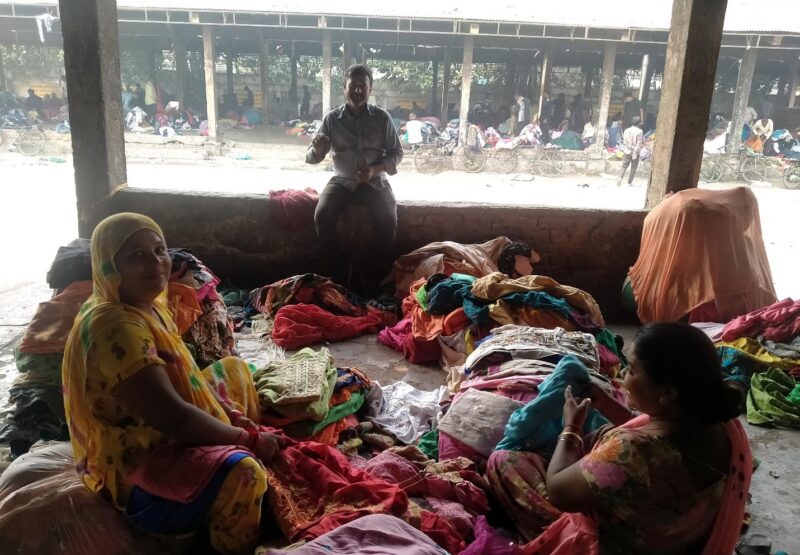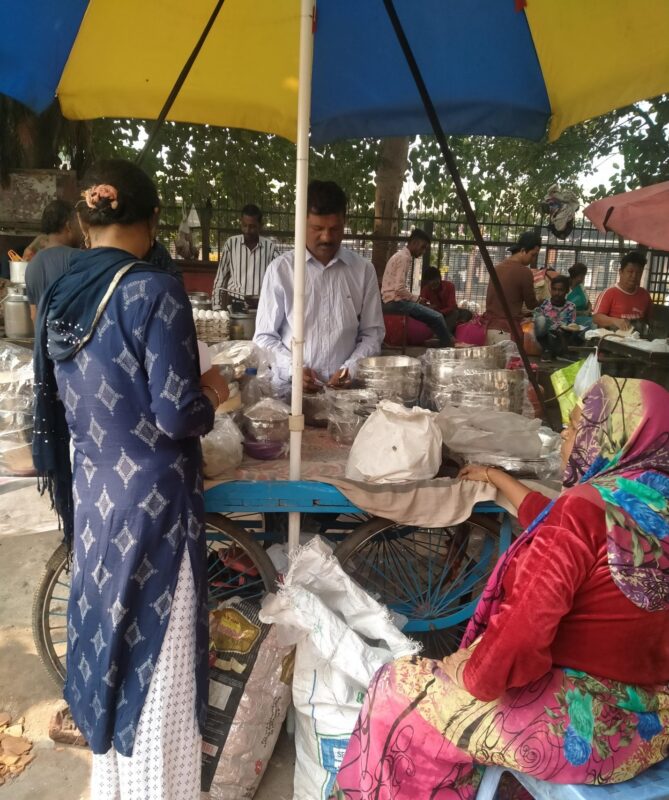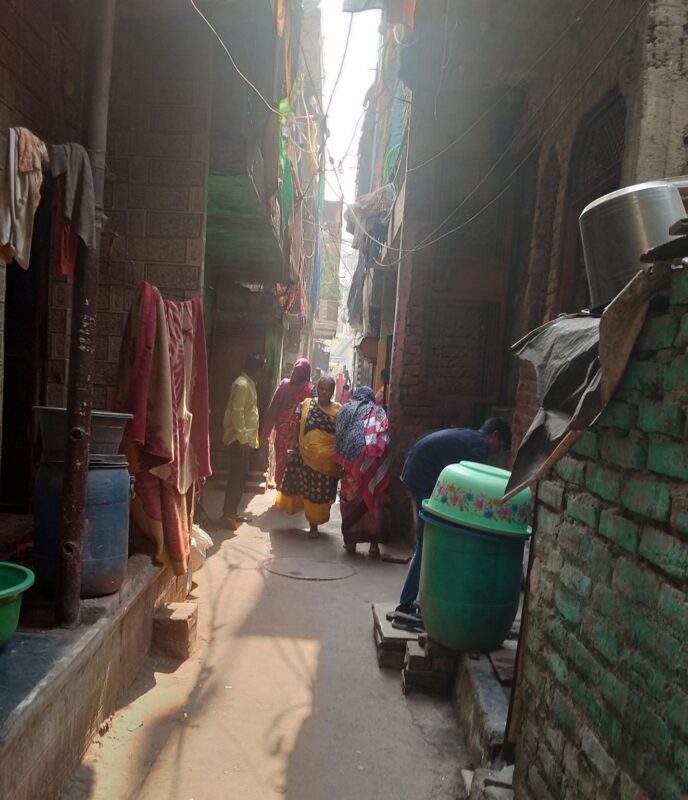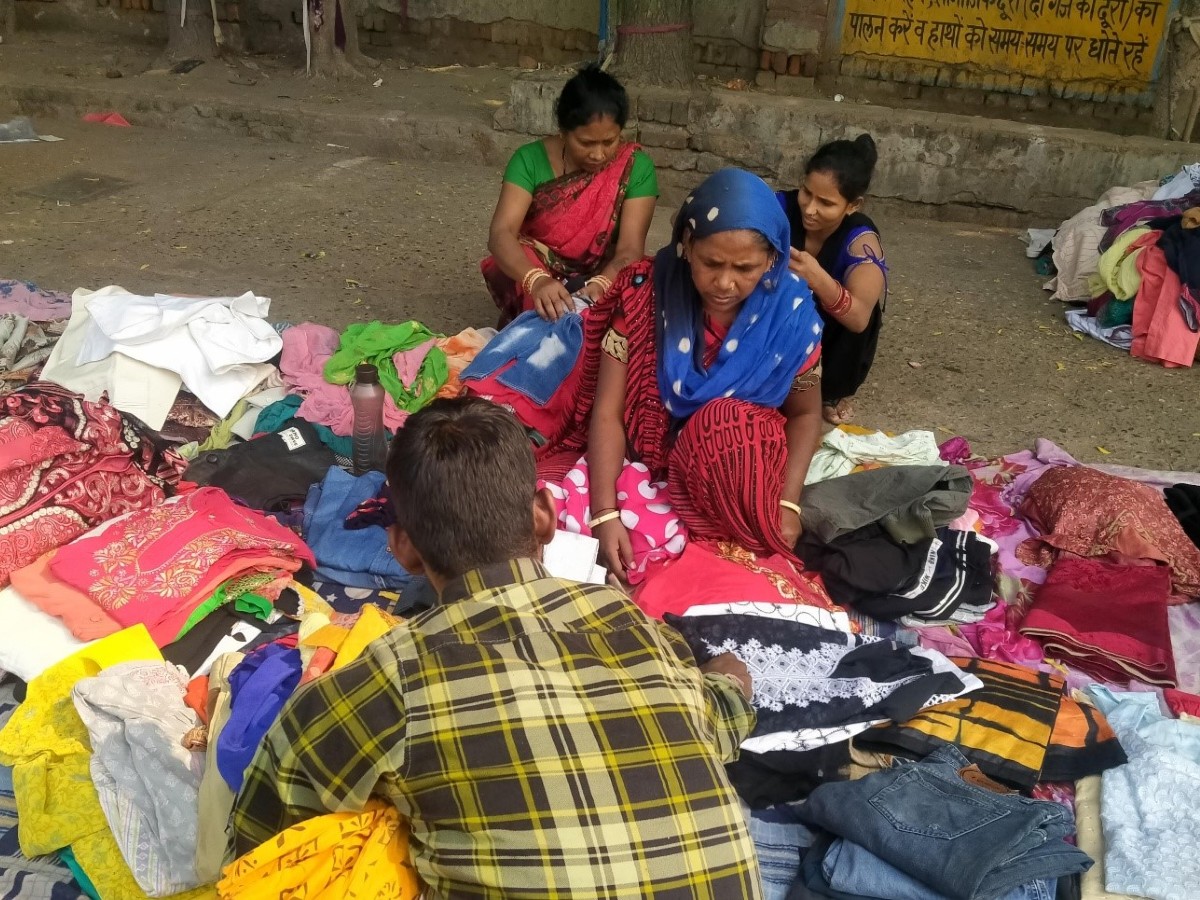Lal Chand is sitting on a parapet smoking a cigarette as his wife Pushpa goes through piles of garments. She is organising the clothes into separate heaps — shirts, trousers, jeans, and sweaters.
“It is time to wrap up here as we have to go for a pheri (hawking goods) to Khanpur village. The clothes that were saleable have been sold already. Poor people come to buy these second-hand clothes from all over Delhi as they don’t have enough money to buy new ones”, says Pushpa.
Bimla, 48, is busy folding an old pair of jeans when a customer comes in and asks the price of a navy blue pair of trousers. “Fifty rupees,” says Kishore. The man who at first seemed interested moves ahead.
Also read: Getting high after a low
Looking dejected, Bimla says, “I was very late today in reaching here. To occupy a prime spot in the mandi, one has to reach by 4 am. I wasn’t able to get up early today because of fever. I hope I’ll do better tomorrow”.

Traditional trade
Pushpa, Chand and Bimla, like several other people in Ghoda Mandi, Delhi’s second-hand clothes market, are residents of a JJ colony in West Delhi’s Raghubir Nagar. They belong to the Waghri community of Gujarat. Mostly, the women of this community walk long distances to barter old clothes for new utensils.
This is a tradition that probably goes back to the early 19th century. It is worth noting how this age-old trade practice has been able to survive a gamut of modern-day challenges.
Popularly known as bartanwalis (women with utensils), the women of Waghri walk through colonies of Delhi carrying a basket of utensils on their heads. Housewives know that they can get new shiny utensils for the kitchen if they pull out old clothes and bedsheets from their closets.
After sorting and washing these clothes, the women then come to Ghoda Mandi in the wee hours to sell the clothes procured the previous day. The market is generally wrapped up around 11 am every morning. An estimated 500 kg of old clothes are displayed at the market in West Delhi on a daily basis. Shirts, sweaters, saris, jeans are sold for anything between Rs 5-20 apiece; garments that don’t sell go for Rs 3-5 per kilo to rug-making factories.
Pankaj, 33, who has been accompanying his wife to households of the capital — a rare practice in the community, says, “My wife often has a backache so I go with her for rounds of the city. The people of Delhi spend a lot of money on buying clothes compared to other cities. They discard old clothes earlier”.
However, it’s a hard trade. As they put it, “Who would give the clothes for free? Naturally, an item of utility is expected in return. We have to bargain a lot.”

Gujarat origins
Originally hailing from Gujarat, members of the Waghri community are known as ‘invisible recyclers’ in society. According to a research journal, they were a nomadic tribe who were categorised as criminals by the colonial British administration under the Criminal Tribes Act, 1871.
Sociologist Sushila Yadav notes that the members of the Waghri community are small-time traders and forest hunters, who worshipped goddesses and lived in Gujarat and Rajasthan.
“We have been working like this for ages, our parents and grandparents worked in this profession”, says Keshav, 60, opening up about his life and hopes for the children. “We don’t have land in the village. This is our destiny”.
He continues: “Dal roti ka jugad ho jata hai, bas (We are only able to live a hand-to-mouth life). I don’t know what is our future in the ever-changing world. Every day, something new comes up and we live in fear of what is going to happen next. My kids are studying in a government school near the colony and I don’t know whether they wish to be part of this profession or have dreams of becoming a doctor or an engineer. All I know is: This is our present”.
Dwindling trade
Necessity is truly the mother of invention. Take the case of Sarita Kumari, 50, who has been bartering utensils for old clothes in Delhi-NCR for almost 25 years. She shares, “These days, many apartment blocks in Delhi don’t allow us to enter the premises. The guards are strictly told not to let us come inside. Earlier, it was easy for us. But now we have to struggle a lot”.
She has come up with an ingenious solution. “I have befriended maids from these posh apartments and high-rise societies. These maids give us clothes that they get free from their employers”.
Inevitably, their direct interaction with better-off people has reduced significantly. In addition, wherever barter is possible, steel utensils have been replaced by plastic products. It is interesting to note how the business model has significantly changed and evolved over the years.
“I bought kitchen utensils worth Rs 5,000 for the occasion of Dhanteras and Diwali but I wasn’t able to recover even half of this investment”, says Ram Chandra, 44. “After the pandemic and especially due to inflation people have become reluctant to engage in this exchange process. For a poor person like me who lives on rent, it is very difficult to manage. There’s no support from the government or even society. Look at the skyrocketing prices of edible oil, vegetables and milk”.
Neetu, 31, holds a potli (bundle) outside the mandi premises where there are hundreds of women like her waiting for the bus. She sips tea while her three-year-old child is playing with other kids. She says, “Thanks to the Delhi government, I don’t have to buy tickets while travelling in a bus. Otherwise half of our money would have gone into bus tickets”.
Obviously very clued into Delhi politics, Neetu started explaining the difference between the two main parties in the state. She says she would cast her vote for the party which actually helps the community one way or the other.
She does not have to go far to purchase utensils. “Several utensil stalls and shops have cropped up in the colony over the years. I buy them once I am done with the mandi work. I make around Rs 400 per day. I am a regular customer at this particular stall for buying utensils and hence I request the shopkeeper at times to give me some time to pay the amount. This is how we survive”, she says.
All this time, Neetu is delicately balancing utensils on one shoulder and bundles of clothes on the other.

Raghubir Nagar
Stepping into the JJ colony in Raghubir Nagar, one witnesses narrow streets where one lane leads to another and you can easily get lost. Here one can see the process of old garments getting a new lease of life. Houses that look like dens have more piles of clothes than living space. Someone is washing mounds of clothes outside the house, where tap water seems like a luxury.
Inside most houses, women are either washing clothes or mending them to make them saleable. “I sell these jeans in the Tuesday market in South Delhi. I buy these jeans from the clothes mandi for Rs10 a piece and after washing and ironing, I sell them for Rs 60”, says Raghu Kumar at his small house in the colony.
“We make good money if we sell directly to customers in flea markets instead of customers and traders who venture into Ghoda Mandi”, he adds.
However, most people in the community say that the competition in the market is increasing day by day and they are struggling. Even if they go to sell the garments in the flea markets, they have to ‘request’ the police to let them sit and sell. Moreover, there are not many flea markets left in the city. People have enough money to shop at glitzy malls and online retailers at good discounts.
Makhan Lal, 63, another resident of the colony, asserts, “A large number of people from the Waghri community shifted from Gujarat and set up their shanties back in the 1960s. Years after independence, we were allotted plots in 1977. Our income has indeed stagnated, especially over the past two decades”.
It is 11:30 am and Kishore is ironing a shirt. “We have to wash the garments, mend the defects and then give finishing touches by ironing the clothes to sell. I am living in this colony for the past two decades. Do you see the condition of our houses? The landlords charge high rent and that too without any basic facilities”.
He has many complaints about the government’s attitude. “These days, people are talking about dengue in the city. Here, we don’t have access to regular tap water, how do we take care of mosquitoes? The government expects too much from the poor people. They think we don’t have brains to think,” asserts Kishore.
Kishore also adds that people like us, from the media, come quite often and make videos. “We ask them, when will our voice be heard outside this colony?” Of course, it gets heard but in a city abounding with problems, this community has not found any political leader with the will to improve our lot.
Follow us on:
Instagram: instagram.com/thepatriot_in/
Twitter: twitter.com/Patriot_Delhi
Facebook: facebook.com/Thepatriotnewsindia





